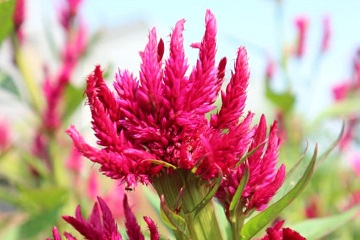IPB Experts Reduce the Feeling of Bitterness on the Leaf of Torbangun

Fulfillment of food in developing countries in realizing food sovereignty is the main target which continues to be carried out. Plant breeding is certainly often heard by the people of Indonesia. Various researches have been carried out by researchers in producing superior varieties in order to obtain high productivity and sustainability for the environment.
On the other hand, in addition to developing research on food, Indonesia also has one other potential, tropical ornamental plants. Tropical ornamental plants are plants that thrive in Indonesia which also have other benefits both as medicine and cosmetics. Increasing diversity in tropical ornamental plants can be done through several methods of breeding both biotechnology and conventionally. For example, by hybridization (crossing between male flowers from plant A with female flowers from plant B which has different characters) or by means of induction mutations.
Induced mutation is an attempt to change the arrangement of genes or chromosomes that can be done by using physical mutagens, chemical mutagens or biological mutagens.
Dr. Syarifah Iis Aisyah as one of the lecturers of IPB University, Department of Agronomy and Horticulture, Faculty of Agriculture has studied mutation induction in various tropical ornamental plants in Indonesia. The aim is to increase the value of benefits for tropical ornamental plants themselves.
“Many tropical ornamental plants that actually contain secondary metabolites can be useful for medicine. Examples are chicken comb (Celosia cristata) for diabetes medicine, purslane leaves (Portulaca oleracea) for cosmetic ingredients, and torbangun (Coleus amboinicus) to increase breast milk (ASI). Through genetic mutations, the content of these secondary metabolites can be increased, “he explained.
One of the plants that are being studied with the use of induction mutations by Dr. Syarifah Iis and the team are torbangun (Coleus amboinicus). Torbangun plants are widely used in the area of North Sumatra to increase milk, but the bitter taste is very high. This plant has a higher laktagogum content than katuk plants. Through physical genetic mutations with gamma-ray irradiation, the bitter taste contained in them can be reduced. “This is still in the research, whether this bitter taste is also related to the content of ASI-producing compounds or not,” she added.
From this research, the development of plant diversity through genetic mutations of tropical ornamental plants needs to be continued. There are large market opportunities that can be utilized by the community. “Many regional governments want to be the center of a tropical crop commodity. For example, like the once-held Floriculture agenda, many regions want to host the event. This will certainly be very good for increasing the income of a region,” concluded Dr. Syarifah Iis Aisyah. (RYS)


